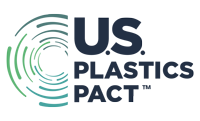The Ocean Plastics Leadership Network (OPLN) neutrally facilitated a group of companies representing the consumer packaged goods sector, packaging converters, Petrochemical sector, and Advanced/Chemical/Molecule (ACM) recyclers to develop this white paper.
The Purpose of These Guidelines
This paper offers guidelines and essential resources for ensuring operational responsibility regarding social and environmental justice, transparency, environmental impact, and complementarity to existing recycling systems. The US Plastics Pact is hosting this white paper as a foundational starting point for dialogue with its members as it seeks to achieve its ACM-related deliverables in Roadmap 2.0.
The release of these guidelines marks an important first step in addressing complex questions surrounding ACM recycling. While businesses increasingly recognize the impact of climate risks on their operations, the debate continues over whether ACM can mitigate those risks—particularly when outputs include fuel or require virgin feedstock. Concerns also persist about ACM processes exacerbating environmental justice (EJ) impacts, especially in communities near industrial operations that use hazardous chemicals. These guidelines provide a framework for ongoing conversations about what must be true for ACM recycling to be a proactive, responsible strategy in addressing climate and EJ concerns.
*A Note on the 9 month process that produced this paper:
Since its inception, OPLN has acted as a neutral facilitator for difficult discussions on subject matter spanning the entirety of the plastics crisis. OPLN does not take advocacy positions and works with stakeholders across the plastics value chain, NGOs, governments, and supranational organizations.
An important first step toward responsible ACM recycling
The guidelines provide a critical starting point for companies advocating for ACM recycling, establishing a baseline for developing more comprehensive standards moving forward. Designed with the future of recycling in mind, they emphasize operational transparency, environmental stewardship, and proactive community engagement. As climate risks continue to rise, these guidelines enable businesses to shift from reactive to proactive strategies, fostering long-term sustainability and resilience.
Four Pillars for Responsible ACM Recycling
The guidelines are structured around four key areas that support responsible business practices while addressing climate risks and prioritizing social justice, environmental justice, and human rights. These principles ensure that communities most affected by industrial operations are treated equitably and that businesses proactively address these concerns. Operational transparency is central, requiring businesses to disclose critical processes such as chain of custody and mass balance principles, reducing the risk of greenwashing. The guidelines further emphasize transparent reporting on emissions, water usage, and waste management, empowering companies to reduce their climate impact and demonstrate environmental responsibility.
The guidelines also highlight the importance of community engagement, prioritizing all stakeholder’s health, safety, and equitable treatment. ACM recycling complements traditional mechanical recycling systems, targeting waste streams that mechanical systems struggle to process, diverting more materials from landfills, and reducing pollution.
Additionally, the guidelines introduce 22 Responsible Production Performance Indicators, providing businesses with measurable standards to monitor, audit, and disclose their ACM operations. These indicators ensure compliance with rigorous environmental and social benchmarks.
The conversation must start now
The guidelines do not claim to have all the answers, but they initiate critical discussions. They aim to help businesses explore whether ACM can fit into a responsible solution for the plastics crisis. The guidelines also outline the necessary production practices that could mitigate climate risks and address the environmental justice and human health concerns associated with plastics. The U.S. Plastics Pact has called for voluntary business commitments to tackle these issues, and this framework is a significant step in that journey.
